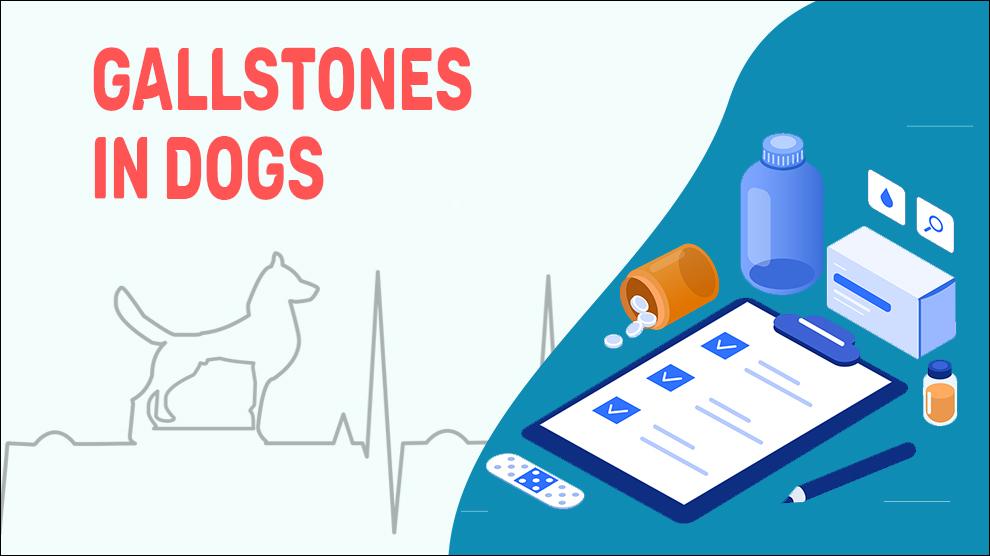Gallstone is a medical condition resulting from the formation of stones in the gallbladder. Gallstones may vary in size, shape, and composition. The gallstones can range in size from small specks to large enough stones to cause obstruction in the gall bladder.
Gallstones are also called choleliths or cholelithiasis. The bile composition in dogs is different from that in humans as the dogs have low cholesterol saturation and calcium stone composition. They usually contain calcium salts, cholesterol, bilirubin, proteins, and bacteria. When the conditions are right (or may be wrong), these substances merge together with the bile, effectively forming a hard blob that ultimately results in a solid stone. The formation of Gallstones happens because either there is something wrong with the bile of the gallbladder that isn’t functioning properly.
A common cause is especially thick bile or a tumor that blocks the bile’s transport into the intestines. Irregular bile flow can also occur when the pet has high bilirubin, triglycerides, or cholesterol. Poor diets, such as those with not enough Aminoacids (taurine) and protein or too much fat can also cause gallstones.
Sometimes, gallstones in dogs may not cause any symptoms (asymptomatic) and don’t cause the pet any problems; however, gallstones can sometimes lead to pancreatitis (inflammation of the pancreas) and/or cholangitis (inflammatory condition of the biliary tree, gall bladder and/or liver).
Symptoms Of Gallstones
Treatment Options For Gallstones
Treatment depends on the cause.
- In more severe cases, hospitalization at 24-hour intensive care and monitoring.
- Pain medications
- Intravenous fluids
- Antibiotics, if a secondary bacterial infection is suspected.
- Anti vomiting medication (antiemetics).
- Corticosteroids (prednisone, prednisolone, dexamethasone, triamcinolone) and other immunomodulating medications (such as Cyclosporine (CsA), Azathioprine, Mycophenolate mofetil) are provided.
Removal of gall stones:
- Surgical removal: Cholecystectomy.
- Non-surgical removal: Urohydropropulsion (special catheter with a saline solution flushed through the bladder to expel the stones).
- Dietary dissolution: High-protein, low-fat diet.
Home Remedies For Gallstones
- Adjunctively to standard therapy, Liver supplements are often used for cholangiohepatitis and these include silybin, S-adenosylmethionine (Sam E), milk thistle and
- Ursodiol (Ursodeoxycholic acid) use is better established in dogs. It is a naturally-occurring bile acid that improves flow through diseased bile ducts and helps reduce the viscosity of bile.
- Until the post-operative recovery period is over, do not allow your dogs to play outdoors. This will reduce the risk of infection and injuring the surgical site.
Prevention Of Gallstones
Prevention of gallstones can be done only by preventing underlying causes. Pet owners should discuss how to prevent the possibility of gallbladder disorders with the vet.
Affected Breeds Of Gallstones
There is no breed or sex disposition. Older dogs are at a much higher risk of infection (median age is 9 years).
Small Dog Breeds, Shetland Sheepdog, Poodle, Miniature Schnauzer, Middle Age Dogs, and Senior Dogs are overrepresented.
Additional Facts For Gallstones
- Causes:
- Cholestasis (decrease in bile flow or complete stopping).
- Inflammatory bowel disease (IBD).
- Gallbladder stones
- Chronic pancreatitis (inflammation of the pancreas).
- Unhealthy gut
- A weakened immune system.
- Thickened Gallbladder secretions that are unable to be excreted by your dog.
- Disorders that impede bile flow.
- Tumors
- Mortality:
Gallstones are usually a benign condition and usually do not progress to malignancy as the tumors often don't change much over time. The mortality rate of acute pancreatitis (caused by gall stones) has remained at about 10 - 20%. Although the mortality rate of chronic pancreatitis is not available, it causes severe damage to your pancreas. So typically the survival Rate will be reduced if not treated properly.
- Diagnosis:
- Endoscopic Retrograde Cholangiopancreatography (ERCP).
- Percutaneous Transhepatic Cholangiogram (PTCA).
- Urinalysis and bloodwork
- Serum biochemistry profile
- X-rays
- Ultrasound, CT scan
- Prognosis:
The outcome of Gallstones treatment is based on the etiology. If left untreated, it can lead to sepsis and will be life-threatening. When the obstruction is due to chronic liver pathology, the prognosis is usually poor. Obstructions of bile ducts caused by cancer often have a worse prognosis.
Proper diagnosis of this disease is always best left to your vet to make sure that it is not progressing into a serious form.
When To See A Vet
Time to visit the vet clinic for an examination, if you notice any of the following:
- Enlargement of the gall bladder.
- Abdominal pain
- Abdominal fluid accumulation
- Icterus (jaundice).
Food Suggestions For Gallstones
- Diet high in protein, complex carbs, and low fat.
- Protein: High protein diet comprising 40% of the dog's calories.
- Good fats: Omega-3 and other healthy fats.
- Complex Carbohydrates: Fibers and starches (Whole Grains, Oatmeal, Brown Rice, Potatoes & Sweet Potatoes).
- Overweight dogs - Lower calorie diets, for underweight dogs - Higher calorie diets.
- Feed foods have a lower (or moderate) Glycemic Index and Glycemic Load than others.
Conclusion
When there is an underlying reason for your pet’s gallstones, such as a disorder, infection, or tumors, then your vet may recommend further diagnosis as that condition must be treated in addition to the gallstones themselves.
Mostly, gallstones are treatable and are not fatal to the dog. However, untreated stones may lead to other complications like Blockage of the bile duct.

















